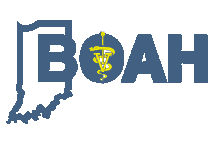Indiana defines poultry as: chickens, turkeys, ostriches, emus, rheas, cassowaries, waterfowl (domesticated fowl that normally swim, such as ducks, geese and swans), game birds (domesticated fowl such as pheasants, pea fowl, partridge, quail, grouse, and guineas).
Indiana Poultry Entry Requirements
Will you be purchasing birds from another state?
Click here for Indiana's bird entry requirements.
Indiana Poultry Entry Requirements – Infographic
Record Keeping Requirements
Bird owners are required to maintain records of flock additions and removals for 3 years. This requirement is part of Indiana's Animal Disease Traceability (ADT) rule, but was adopted in the wake of the 2015 highly pathogenic avian flu event that impacted more than 200 farms with 48 million birds.
Records must include: names and addresses of buyer and seller, sale date, breed, sex, number of animals and reason for movement.
Example Record Keeping Sheet PDF
(NOTE: Poultry owners do not have to use this form, but it is provided as an example.)
Poultry species DO NOT have to be individually identified. But, if the birds do have identification such as a band, then the identification needs to be noted in the poultry movement records.
Premises registration of poultry sites is encouraged, but not required.
Click here for information on premises registration and to register your premises.
Indiana rule regarding the record keeping requirements for the movement of poultry within and into Indiana.
LSA #15-346
Indiana Exhibition Requirements
Click here for Indiana's Exhibition Requirements.
Testing Information for Exhibiting Poultry in Indiana – Infographic
Recommended Practices to Protect Avian Health at Indiana Poultry Shows and Exhibitions
Keep Your Birds Healthy
Biosecurity means doing everything you can to keep your birds free from disease. "Bio" refers to life, and "security" indicates protection. Biosecurity is the key to keeping your poultry healthy. It is what you do to reduce the chances of a disease being introduced to your birds by people, animals, equipment, or vehicles.
Be sure to follow simple hygiene steps such as keeping cages and equipment clean and not sharing supplies with other bird owners. Minimize/reduce contact between your birds and wild birds.
A free flock health screening is available through the Indiana State Poultry Association's T-12 program. Learn more: www.inpoultry.com
For more information on biosecurity for birds go to: USDA Biosecurity for Birds.
Reporting Sick/Dead Poultry
Indiana poultry owners are encouraged to complete this questionnaire for reporting sick and/or dead poultry to the Indiana State Board of Animal Health (BOAH).
Sick/Dead Poultry Questionnaire
Health & Disease Information
- Exotic Newcastle Disease (END)
- Highly Pathogenic Avian Influenza (HPAI)
- Low Pathogenic Avian Influenza (LPAI)
- Psittacosis
- Reportable Disease List
- Salmonella
- Winter Preparation and Biosecurity for Poultry
- Dead Animal Disposal
Eggs & Meat
The Indiana Egg Board registers individuals and companies to sell eggs. For more information visit the egg board's website at: www.ansc.purdue.edu/iseb/.
BOAH's Meat & Poultry Inspection Division oversees the inspection and sale of meat and poultry products in Indiana.
National Poultry Improvement Plan (NPIP)
Indiana State Poultry Association (ISPA) is the designated official state agency to cooperate with the United States Department of Agriculture and Board of Animal Health in administering the National Poultry Improvement Plan.
Poultry Links
Like BOAH Avian Health on Facebook at: facebook.com/INAvianHealth
Purdue University Poultry Resources
